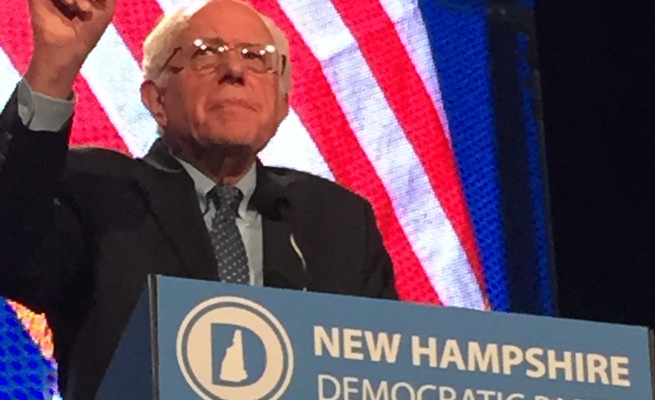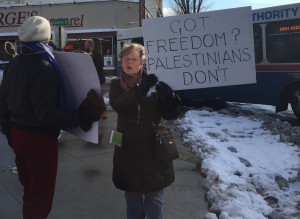Sanders’ Religion, Israel Politics, Simmer Below the Surface

MANCHESTER, N.H. — Janet Simmon, a Bernie Sanders supporter, stood in downtown Manchester Saturday afternoon with a sign that read, “Got Freedom? Palestinians Don’t.”
“It’s about basic human rights,” Simmons said. “We send $3.8 billion [in foreign aid] to Israel, more than any other country combined,” she said, arguing the United States is complicit in the settlement of Israelis in Palestinian territory. CNN reports the number is $3.1 billion, out of $5.9 billion in foreign aid overall.
Simmon, though not campaigning for Bernie Sanders, wore a campaign button touting the Vermont senator bid for the Democratic presidential nomination. When asked about Sanders’ support for the issue, Simmon said, “He has an open mind. … I think he will be willing to work for human rights.”
She said that although Sanders is Jewish, he hasn’t said much about the issue.
“But you can only say so much, and he has a focus right now,” she said.
Simmon has noticed what many have: Sanders’ message about revolution and a fairer economy have almost entirely eclipsed any notice of Sanders’ Judaism or opinions on Israel politics. But that doesn’t mean the conversation about Israel isn’t happening.

Janet Simmon calls out to passing cars with a fellow protester. Photo by Carrie Giddins Pergram
Sunday morning, in a pre-taped segment of Meet The Press, Chuck Todd pressed Sanders for names of people and groups giving him foreign policy advice. Differentiating himself from former Secretary of State Hillary Clinton, Sanders mentioned Jim Zogby, president of the Arab American Institute, and J Street, an advocacy group that is working for a peaceful two-state solution for the Israeli-Palestinian conflict.
J Street is often considered an outsider organization, while AIPAC, a strongly pro-Israel lobbying organization, is seen as the mainstream position-maker. The annual AIPAC Policy Conference is the largest gathering of members of Congress, except for the State of the Union. The fact that Sanders cited what many consider to be its counter-organization speaks volumes to the contrast between his view of Israel and the conventional view of Israeli issues in American politics. J Street President Jeremy Ben-Ami has said his group reflects the diversity and moderation of the Jewish community in the United States.
Sanders has reflected the J Street message of a two-state solution for many years. In August, Sanders said, “Palestinians are entitled to a state of their own and the United States should do what it can to make sure that state has a strong economy. Israel is entitled to live in security, not be attacked.”
In a video of a 1988 roundtable with the then-mayor and congressional candidate, Sanders delivered a similar message.
Sanders, who recently became the first Jewish candidate to win delegates for a presidential nomination, has not entirely won the hearts and minds of Jewish voters.
The only poll conducted of Jewish voters was in September 2015, and it found that Jewish voters preferred Clinton to Sanders at a 2-to-1 margin.
“There is very little talk about him as a Jew,” said Rabbi Jonathan Spira-Savett, whose congregation, Temple Beth Abraham, is in Nashua, N.H.
Noel Rubinton reported in an article for forward.com that Rabbi Spira-Savett said the members of his congregation “have generally found the Israel positions of all Republicans except for Rand Paul to be satisfactory, but they want to know more from Sanders on how he’d work with Israel.”
Correct the Record, a PAC and strategic communication organization supporting Hillary Clinton, has published a list of the various ways in which Clinton has supported Israel.
Sanders is finding his own way to discuss his Judaism. Saturday night, in an episode of “Saturday Night Live” hosted by Larry David, Sanders joked in a sketch that his last name had once been “Sanderswitsky.”
“We’ll change it so it doesn’t sound so Jewish,” Sanders said.
“Yeah, that’ll trick them,” David replied.







Comments are closed.